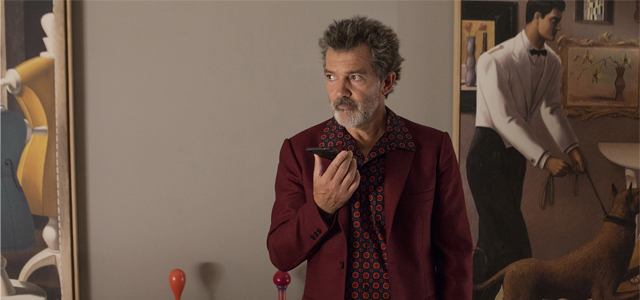Review: Pain and Glory
Pedro Almodóvar may not be a household name to many outside of the cinematic community or beyond the borders of Spain, but his influence is without question. The director of The Skin I Live In and Volver is known for his creative eye, innovative writing and the ability to get the most out of his actors. Antonio Banderas and Penelope Cruz are regulars in many of Almodóvar’s projects and they continue with critical roles in Pain and Glory.
Banderas plays the legendary film director, Salvador Mallo, who has come to the point of artistic and personal depression. With his glory days behind him, he has moved into a lethargic existence of addiction and self-loathing because of his physical and mental ailments. When an opportunity comes for reconnecting with the cast from Sabor (his most celebrated film) after thirty years, he begins to reignite his passion for the cinema. When one of his unpublished screenplays is discovered by his former friend and nemesis, Alberto Crespo (Asier Etxeandia), the flood gates to his past open and with these memories come more inspiration.
Throughout his journey into the peaks and troughs of his life, Salvador reflects on the simple village life that influenced and inspired his creativity. From his thoughts as a child and the undeniable impact of his mother through to the tumultuous relationships he experienced at the height of his career. Each of these recollections began to determine his future and something in his life he had chosen to forget. The people who care for him most try to help him out of his physical difficulties while the director discovers his long-lost love for the cinema again.
What seems to unfold on the screen is a fictional tale that hinges on the reality of the life of the undisputed master of Spanish cinema. This personal display of this artist’s tragedy and triumph in life manages to show that one of these elements cannot exist without the other, indicating that a valley inevitably exists on the other side of each mountain. Banderas embodies the physical and emotional vulnerability of his character with a depth unlike any role in his career. These two men manage to blur the lines between the artist behind the camera and the one he is filming. An experience that seems to expose both to the vicious, but magical world of filmmaking.
The screenplay does not hold back on showing the darkest and brightest aspects of the director’s memories and life. The writing confronts his dependence on heroin and the emotional anguish he experienced during his sexual awakening of his childhood and during the 1980s. Each of these bleak components of his life are countered with the beauty of his childhood and aesthetics of the Spanish village of his youth.
This intimate portrait of this artisan’s life will cause a level of discomfort and extreme euphoria for anyone willing to dip their toes into the waters of Pedro Almodóvar’s work and life. A film made for those with discerning taste and an appreciation of cinematic art that unapologetically displays the very heart of the artist who created it.
Reel Dialogue: Why do we have to suffer?
During one of his self-evaluations of life, Salvador Mallo determines that much of life is suffering. These challenges even made him consider the existence and the need for God, but ultimately he decides to be an atheist instead.
A choice that many make, but for those still pondering suffering and how this affects your view on the existence of God, it might be surprising, but Christianity is the only worldview which has an actual answer to the problem of evil and suffering. Christians can attest to the fact that they serve a God who lived as a man on this earth and experienced temptation, torture, hunger, thirst, hatred and death.
Due to the work of Jesus on the cross, the justice of God is manifested in his son. The cross is a means of symbolising how much God cares about humanity’s suffering. A more profound conclusion is that we may never know the specific reason for our suffering, but that we can identify the God who understands the rationale behind the pain.
‘And the God of all grace, who called you to his eternal glory in Christ, after you have suffered a little while, will himself restore you and make you strong, firm and steadfast.’ 1 Peter 5:10
Pain and Glory is now showing in cinemas.
Russ Matthews













